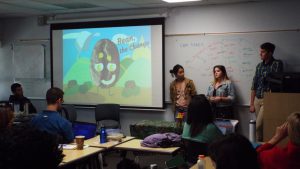Friday, June 23rd, 2017...9:57 am
Amy Nguyen is taking DPMI beyond the classroom.
 Hello! My name is Amy Nguyen, and today I will be sharing my experience in the Design, Partnering, Management and Innovation (DPMI) program in Monterey this past May.
Hello! My name is Amy Nguyen, and today I will be sharing my experience in the Design, Partnering, Management and Innovation (DPMI) program in Monterey this past May.
A bit about me: Within the Development Practice and Policy (DPP) program, I am working towards a Master in Public in Administration (MPA) with a specialization in Monitoring, Evaluation, and Design. Prior to MIIS, I worked for the organization, Relief International (RI) (www.ri.org), where I am a still a member of its Performance Accountability and Learning team.
DPMI was a big draw for me when I applied to MIIS. I liked the idea of learning not only how to design projects, but also how to flip the traditional design process: how to make it more dynamic, more iterative and more community-oriented.
The two instructors, Beryl Levinger and Evan Bloom, have designed a unique, very hands-on learning environment. Over the span of the two weeks, we did all our work in teams: in the first week, to identify a development challenge facing a country and design a project, and, in the second week, to design a social innovation through collaborating.
These team projects took my mind to incr edible places: first, to the coastal Ayeyarwady region in Myanmar, and, then, to the mountainous community of Barillas, Guatemala. Both projects involved understanding and addressing challenges facing farmers. Throughout the two weeks, we mixed and matched approaches, learning traditional tools and methodologies (e.g. as results frameworks and indicators) along with emerging ones (e.g. human-centered design, social network analysis).
edible places: first, to the coastal Ayeyarwady region in Myanmar, and, then, to the mountainous community of Barillas, Guatemala. Both projects involved understanding and addressing challenges facing farmers. Throughout the two weeks, we mixed and matched approaches, learning traditional tools and methodologies (e.g. as results frameworks and indicators) along with emerging ones (e.g. human-centered design, social network analysis).
My DPMI cohort was a fantastic group of working professionals and students. Each of us brought a different lens to the table: health, gender, migration, environment, education, and others. We asked hard questions. We brainstormed. We listened. And, just as importantly, we had fun. Somewhere in the mayhem of Google Drive folders, sticky notes, and team ground rules, our cohort was buzzing with energy and a sense of purpose. It felt like we were learning new approaches to think and work through development challenges… with some of the very colleagues whom we may be working alongside in the future.

DPMI has opened up new areas of work for me at RI. I am becoming more involved in the development of our new global partnerships strategy. This summer, I am completing my practicum with our Myanmar country team, focusing on ways to strengthen program quality through monitoring and evaluation (M&E), design and strategy. All of my deliverables will be tied to content from the DPMI modules. I’m excited to see my newfound skills and knowledge spring to life; as Beryl would say, I am excited to “hit the ground thinking.”
People, systems, and process matter a lot to me. Upon returning back to school, I felt it was important for me to become exposed to the methodologies, tools, and approaches that honor that principle. In the development field, we spend a lot of time in the development feeling stuck: The problems are great, and they are many. It is easy to feel beholden to the traditional way of doing things. DPMI beckoned us to do differently, and I am a better practitioner now because of it.


